If you have not already done so, please read my previous post. It serves as an entree to this. My line of thinking is both extended and broadened to a degree – that simplicity, beauty and elegance in the arts, the sciences and in life are so closely entwined that they are as one.
In my last post I explained how I personally arrived at the level of simplicity in many of the short pieces that will constitute my next CD. I stated that “writing the short pieces ultimately became the art of omission”. Along similar lines Michelangelo is reported to have declared “It is easy. You just chip away the stone that isn’t David”. To achieve simplicity was anything but simple. I was challenged in grasping the essence of what always could be expressed in a more complex form. I believe that it takes a great deal of courage and nerve for a composer or any kind of artist to move away from the “grand gesture”, the glorious din of an orchestra in full spate, the larger Wagnerian scale works, masses, suites,operas, sonatas, quartets, variations … These have always tended to be at the heart of the culture that is referred to as classical music. To quote Feldman, “Unless we take a chance, we die in art”. But is an idea necessarily “better”, have more artistic value, integrity, because it is complicated?
I believe that simplicity is subjective, relative, and can only be decided on a personal level. Robert Sapolski, a Stamford neuroscientist, puts it so neatly, “You know it when you see it”.
Allow me to illustrate this point by presenting the musings of a few Greats. Let’s turn to Chopin, “Simplicity is the final achievement. After one has played a vast quantity of notes and more notes it is simplicity that emerges as the crowning reward of art” Now I know most of Chopin’s piano music well, it rescued me from a troubled adolescence. I have played many of his etudes, preludes and waltzes in public performance. There is almost no piece in his entire output that I would label as simple. Elegant and often ethereal in beauty but hardly simple in the sense that I have described in my last post. His simplicity is not mine.
And now Brahms, another composer whose piano works I know well,”It is not hard to compose but what is fabulously hard is to leave the superfluous notes under the table”. Not hard to compose? I wish. But again, when you recall his monolithic chord structures, those dense, rich textures, works infused with development and variation none of which I would describe as being of short duration, I do not recognise the Master’s attempts at bringing any simplicity to his compositions. And as for his wonderful profound orchestral masterpieces … Simplicity no. Reductivity and Brahms an oxymoron, yes.
What would have been the reaction of these advocates of simplicity to the music of, say, Moreton Feldman? Many of this composer’s later piano works are an extremely long series of single notes played very slowly, the decay of each note being of importance. Often his music approaches a whisper. There is very little left to listen to. They exist on the edge of silence. His pieces acquire an ethereal quality, addictive and meditative and at the same time remind us that to achieve simplicity is anything but simple.
Opening up the thread. I see simplicity as both and art and a science. It is perhaps not appreciated as fully as it might be, as technical and scientific progress sweeps us all along into ever more hectic, complicated, technology-driven lifestyles. We are being carried along by a tsunami of rapid advances in technology. It is becoming increasingly more difficult to “keep things simple” as it is far often more difficult to communicate the complex in simple terms. Steve Jobs has said “Simple can be harder than complex. You have to work hard to get your thinking clean, to make it simple. But it is worth it in the end because once you get it you can move mountains”. My new smart phone had almost 200 pages of (on line of course) instructions which were often couched in what was for me, impenetrable technospeak. I resorted to seeking advice from others who had had similar struggles. I really just did require a telephone. I have acquired something that has more technology than the spacecraft that took man to the moon.
If the point of technological development is,in the end, to make our lives easier, simpler, I feel that this is certainly not the case at present. Are we unthinkingly accepting complexities in our lives that are not always necessary? Is it an exaggeration to say that the advocates of complexity are usually those who make a living from the complexity they create for us to the point of us not understanding anymore? Furthermore that these advances are not always to our benefit as we can see from the many new inconveniences and problems that inevitably arise from such progress. Are these concerns justified? Do you share similar feelings? Do I stand to be accused of being tending towards a Luddite kind of attitude (Luddites being 19th century textile workers who protested against newly developed technologies).
I always try to not make my posts too long – again a self-imposed regime of reductivity. I would like to continue this thread, I feel I am only just beginning to explain my thoughts but I am going to conclude with a quote from Edward Witten, a Princeton Physicist which neatly includes some of the ideas I have attempted to identify in this post “After you define music for me, I will try to define elegance. When a theory or model explains a phenomenon, clearly, directly and economically, we say it is elegant; one idea easy to understand can account for a large amount of data and answer many questions”.





